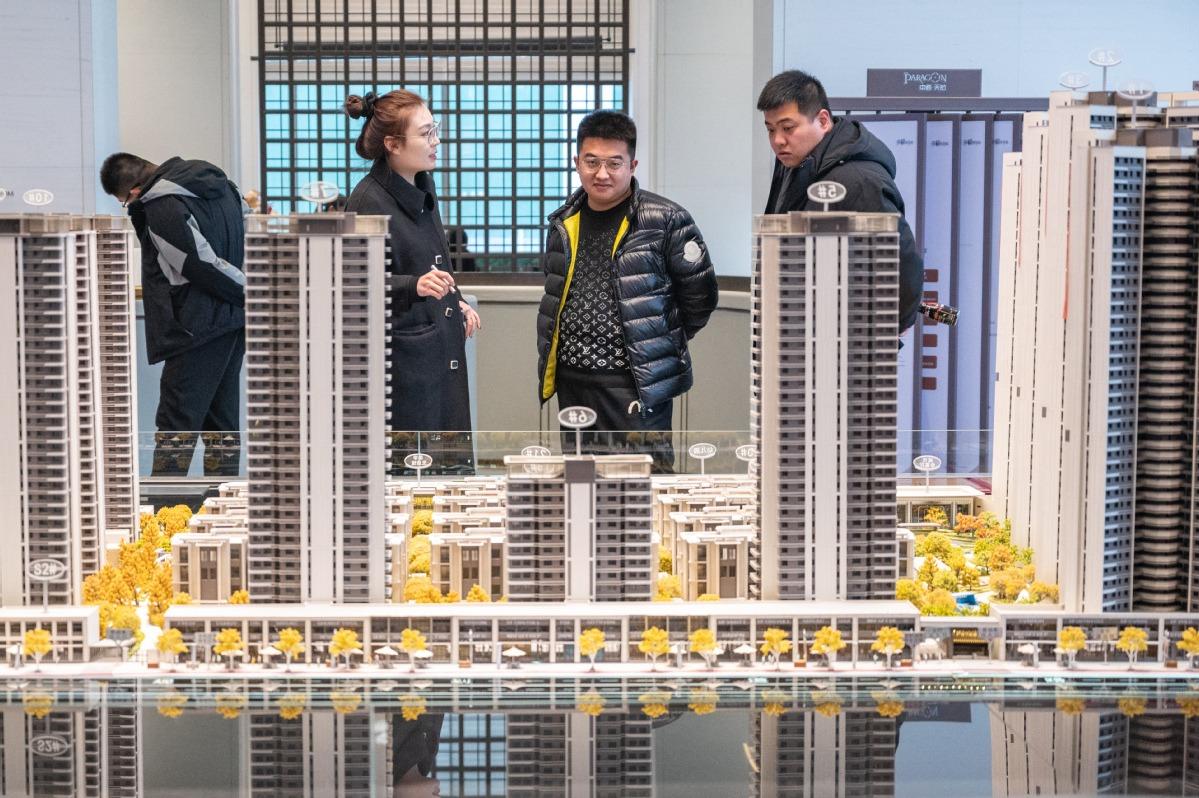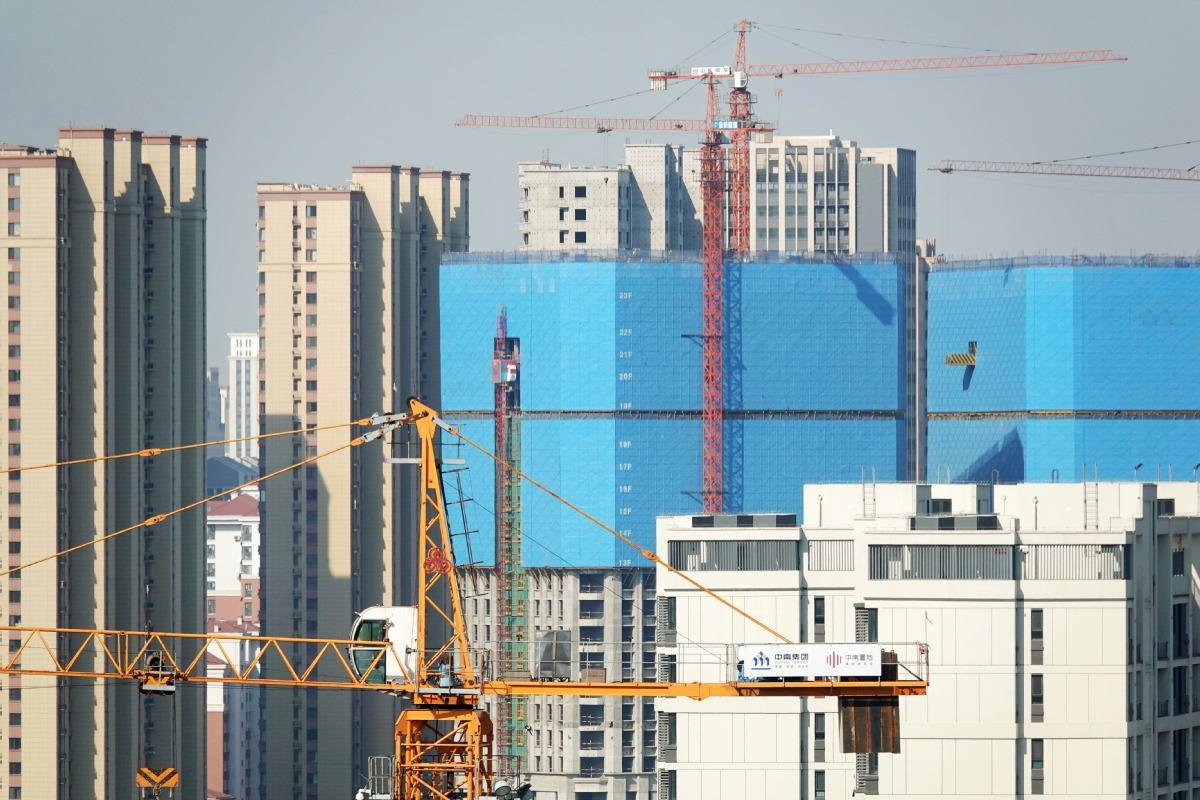 Potential homebuyers look at a property model in Taiyuan, Shanxi province. (WEI LIANG / CHINA NEWS SERVICE)
Potential homebuyers look at a property model in Taiyuan, Shanxi province. (WEI LIANG / CHINA NEWS SERVICE)
SHANGHAI – A property market recovery is likely to emerge in many cities in early spring, thanks to the central government's resolve to keep the market healthy and stable, coupled with heightened expectations of more supportive measures from local governments, industry experts said.
With the property market entering its traditional sales season in March and April, hopes for a boost in spring sales have been raised by multiple factors including positive signals from the two sessions, the effects of supportive measures announced by major cities, and the gradual recovery of market expectations and confidence.
The Government Work Report, delivered in March at the second session of the 14th National People's Congress, the nation's top legislature, outlined key tasks for the property sector. These tasks include defusing risks in the property market, accelerating efforts to foster a new development model for real estate, and increasing the construction and supply of government-subsidized housing.
Pang Ming, chief economist at JLL China, said the measures are very targeted, and the creation of a new model for property development is the most important one.
"In the future, the new development model will join forces with the property financing system to form a whole-cycle management mechanism of commercial housing, which covers development, construction, financing, sales, use, maintenance, and trading. In the meantime, efforts will be made to ensure various requirements of buying, leasing and government subsidies will be met under the new system," Pang said.
Quality of life
Chen Zhixu, senior manager of CBRE China research, expects a greater balance will be achieved between supply and demand under the new property development model.
"The report also reaffirmed taking action on urban regeneration, which would help optimize supply and promote the release of potential buyer demand," she said.
Shaun Brodie, head of research on the Chinese market at Cushman& Wakefield, a global real estate services firm, said two phrases — "new urbanization" and "green and low carbon development" had caught his eye. "I think both these key phrases will impact the real estate market in China immensely in the future as cities continue to improve the quality of life for their citizens and move toward their netzero carbon goals," Brodie said.
We expect the tailor-made policies to be announced from the capital's suburban areas will also help boost market sentiment.
Chen Wenjing, Director of research, China Index Academy
During the two sessions, Ni Hong, minister of housing and urban-rural development, reiterated the government principle that "housing is for living in, not for speculation". This was viewed by observers as a signal from the central government to uphold the principle amid the ongoing market adjustments.
The principle will continue to define long-term arrangements for the residential housing market in China, Brodie said. By adhering to the principle, a rational, steady and healthy development of the residential housing market in China will be ensured, he added.
"To my understanding, 'housing is for living in, not for speculation' is the premise and the overall position of the new development model of the property market," said Yan Yuejin, director of the Shanghai-based E-house China Research and Development Institution.
"Under such a principle, various related industries will coordinate and join forces to build the new pattern. This gives the parties involved inspiration," he said.
Yan added that market expectations have been heightened by more policy adjustments and the spirit expressed at the two sessions.
Active local responses
One of the cities that has taken proactive measures to invigorate its property market is Hangzhou, capital of Zhejiang province. Hangzhou, famous for its picturesque West Lake, announced on March 14 it is scrapping all purchase restrictions on pre-owned homes.
"This is an immediate response to Ni, who said during his news conference that respective and tailor-made measures will be implemented accordingly from one city to another," said Li Yujia, chief researcher at the Guangdong Planning Institute's residential policy research center.
Local governments have been granted full decision-making power in optimizing their macro-control policies for the stabilization of the market, Li said.
Ni also dispelled concerns that the cancellation of former purchase restrictions may overheat the market. "The key problem of the real estate market is not to prevent overheating, but overcooling," Ni said.
Li said a gradual relaxation of the purchase restrictions is expected. "Specifically, it will start in the outskirts before expanding to urban centers in first-tier cities, and smaller cities are likely to take greater supportive measures than big cities," Li explained.
Beijing is going to take different measures on a district-by-district basis in the optimization of its housing policy, Xia Linmao, executive vice-mayor of Beijing, said at a news conference on March 19. Xia said the precise measures are hoped to better fit people's varied requirements for a home.
"We expect the tailor-made policies to be announced from the capital's suburban areas will also help boost market sentiment," said Chen Wenjing, director of research with the China Index Academy.
Chen said a range of different property-buying measures have already been rolled out across China.
In late January, Shanghai revised its homebuying requirements by allowing eligible nonlocal individuals to buy one residential apartment each outside the city's downtown area. Shenzhen and Guangzhou in Guangdong province as well as Suzhou, Jiangsu province, also modified related housing policies ahead of the Chinese New Year.
"Such tendencies are becoming more evident after the State Council executive meeting was held on March 22, which stressed the significance of the real estate market in the overall stabilization of the macro economy and also demanded more effective measures in driving potential homebuying requirements," Chen said.
Brodie said if executed correctly, and strong local knowledge is taken advantage of, cities' greater autonomy meant real estate markets around the country will be in a good position to become more stable and optimized.
 A view of a property construction site in Yantai, Shandong province. (TANG KE / FOR CHINA DAILY)
A view of a property construction site in Yantai, Shandong province. (TANG KE / FOR CHINA DAILY)
Encouraging signs
Some positive signs relating to the property market were seen in National Bureau of Statistics data released in mid-March.
"In month-on-month terms, the new home price index drop in 70 major Chinese cities has been narrowing for three consecutive months," Yan said.
"Given the continuous supportive measures from local governments, buying enthusiasm as well as home sales volume, both picked up in March, making us believe the home price data stabilization is on a solid footing," Yan said.
According to Brodie, secondhand housing transaction data in China's four first-tier cities — Beijing, Shanghai, Guangzhou and Shenzhen — indicated a rebound continuing into March. The daily transaction volume in Beijing and Shenzhen exceeded 1,000 units; Shanghai's average daily transaction volume reached twice that of February; and Guangzhou's secondhand housing market activity also increased.
"Given that the property market is still at the stage of adjustment and transformation, some time is still needed for the normalization of the new-normal market," Brodie said.
JLL China's chief economist Pang said although sales by floor area continued their year-on-year decline due to the high base they were coming off last year, sales volumes of both new and pre-owned homes rebounded after the Chinese New Year. Overall market prices and sales of products in the real estate industrial chain have also stabilized, he added.
Pang said he expected the fundamentals of the Chinese real estate market to improve in the first quarter, as local governments pushed for more optimization of the market. The volume of new home transactions will see a mild recovery and market activities in large cities will gradually improve, with signs of a stable recovery in property development investment and construction, he added.
Time to move
Wang Shu, 35, who works at a State-owned company, recently sold his 46-square-meter one-bedroom flat in Shanghai's Yangpu district and purchased a 78 sq m two-bedroom one in the same district. "From my personal experience, the current market adjustment offers the best timing for selling an existing home for a better one," he said.
Despite the challenges and difficulties in property development investment, new commercial housing sales will hopefully achieve stabilization both in terms of volume and value in 2024.
Pang Ming, Chief Economist, JLL China
Although Wang pays a higher monthly mortgage, it is more important to him that his son grows up in a comfortable and spacious living environment.
The market sentiment index in 50 key cities has risen for three consecutive months since December, according to data collected by Zhuge Real Estate Data Research Center, which also projected the index to maintain the rebound.
Pre-owned home transaction volumes in core cities have seen weekly rises since the second half of last year, which continued into March, said CBRE's Chen citing a report by the China Index Academy. The transaction volume of new homes will also see a mild recovery.
"Therefore, it is predictable that a mild sales pickup will appear in some major cities this spring, though their performances will vary from city to city," Chen added.
Brodie said the property market is still in the process of adjustment and transformation due to the combined effects of the macroeconomic transition, demographic changes, housing supply, and the principle of housing without speculation.
"Once a new-normal market status quo is reached and achieved, then we will see a healthy and stable real estate market emerge and come to fruition," he said.
JLL's Pang said, "Despite the challenges and difficulties in property development investment, new commercial housing sales will hopefully achieve stabilization both in terms of volume and value in 2024."
With further improvement of property policies, it is only a matter of time before the 20th National Congress of the Communist Party of China's vision for a housing system that takes into account the happiness of the Chinese people is realized, Pang added.
The vision promises to "move faster to build a housing system featuring multiple suppliers and various channels of support that encourages both housing rentals and purchases".


